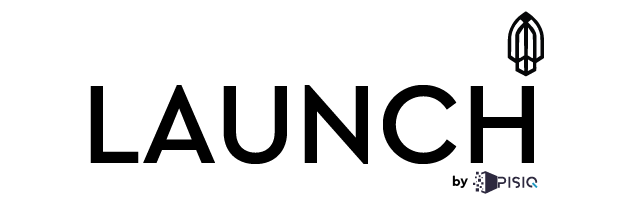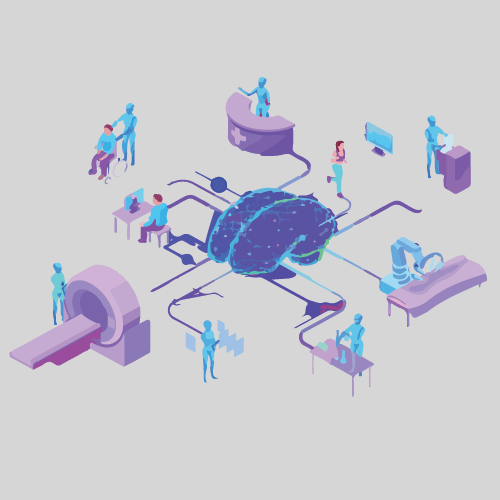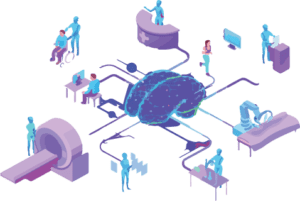Artificial intelligence as a necessary tool is ultimately poised to be the catalyst that drives massive improvements across the healthcare industry, AI truly offers a large number of advantages over the traditional methods of analytics and decision-making techniques. Deep Learning, and Machine Learning algorithms can become more precise, and accurate as they interact with large sets of medical data, allowing humans to gain unprecedented and powerful insights into diagnostics, how to enable efficient care processes, the range of treatment variability, and expected patient outcomes.
AI Technology has massive leaps in the Healthcare industry, and that’s why it’s so vital, it offers a very wide range of assistance, and ease of access to complex operations, helping with prediction, monitoring and managing.
This is Artificial Intelligence in Healthcare Sector
Artificial Intelligence with Neural Network Technology
Using smart computers to communicate efficiently is not necessarily an entirely new idea by any means, but creating intelligent AI guided direct interfaces for technology, and the connected human mind without the need for keyboards and monitors is a cutting-edge development in the vital area of research that has important, and significant applications for patients and uses for practitioners.
Inevitable neurological diseases and trauma to the central nervous system can take away patient’s certain abilities, like the ability to speak, move, and interact meaningfully and usefully with people, objects, interfaces and their respective environments.
Recent developments in Brain-computer interfaces backed by PISIQ Artificial Intelligence, could effectively completely restore those fundamental experiences to those who lost them.
Brain-computer interfaces also generally could, drastically improve the overall quality of life for most patients with neural issues like ALS, or strokes, as well as the majority of 500,000 people worldwide who experience spinal cord injuries every year.
AI Technology for Radiology
Artificial intelligence will truly enable the next generation of smart radiology tools and techniques that are accurate and detailed enough to replace the need for samples in certain circumstances.
Successfully managing this may further allow clinicians to properly develop a more accurate and intelligent understanding of, for example, how tumors behave as a whole instead of basing operational decisions on a small segment of it.
Medical practitioners may also be able to better define the aggressiveness of cancers and target treatments more appropriately and effectively.
Artificial intelligence is helping to enable “virtual biopsies” and advance the innovative field of radionics, which focuses on harnessing image-based algorithms to characterize the phenotypes and genetic properties of tumors.
Integration of Artificial Intelligence in Healthcare industry:
- Intelligent voice recognition and accurate word dictation are helping to improve the overall documentation process
- Natural language processing (NLP) tools are being more upgraded and are generally advanced
- Artificial intelligence will also help to process routine tasks and requests from various services, such as medication refills and result notifications.
- AI will also help to prioritize tasks, ones that require the clinician’s full attention, on basis of importance and severity,
- making it truly easier with the assistance and help of AI for medical practitioners to work through their lists.
Artificial Intelligence for Health
Smart and intelligent wearable consumer tech is taking over the user environment, offering everything from real-time video from the inside of a refrigerator to cars that can detect when the driver is distracted, and even in the Healthcare industry, Smart AI driven smart devices are critical for monitoring patients, in the ICU and elsewhere.
Using artificial intelligence to enhance the ability to identify deterioration, suggest that sepsis is taking hold, or sense the development of complications can significantly improve outcomes and may reduce costs related to hospital-acquired condition penalties.
Case uses for Artificial Intelligence in Healthcare
EHR and AI
An example of effective AI usage, is for managing health record data, but in the electronic format with centralized data, this can and will overall massively help to identify all and any infection patterns, it will also highlight the included patients who may be at risk before they begin to show certain symptoms of illness or sickness.
Electronic database analytics have produced many successful scoring, prediction and rectification tools of AI technology, especially when researchers and Healthcare specialists employ deep machine learning techniques to identify connections between seemingly unrelated datasets and patient information.
Machine Learning and AI IoT
Leveraging and using deep machine learning and intelligent AI tools can drive these analytics towards enhancing their total accuracy and create much more faster, efficient and accurate alerts for the healthcare industry.
Inserting intelligent algorithms into IoT for Healthcare-based devices can reduce cognitive burdens for physicians while ensuring that their patients will receive care.
Machine learning can also help support decisions around whether or not to continue care for critically ill patients, such as those who have entered a coma after cardiac arrest.
Cancer Therapy
Deep AI machine learning algorithms and their intelligent ability to synthesize highly complex datasets, and to illuminate new options for targeting therapies to an individual’s unique genetic makeup, will greatly assist in immunotherapy, as it is one of the most promising treatments for treating cancer effectively, By using the body’s own immune system to attack malignancies, patients may be able to beat tumors of many kinds, though only a few number of patients respond to present immunotherapy options, and oncologists currently do not have precise and reliable methods for identifying which patients will benefit from this option.
Artificial intelligence will provide much of the bedrock for that evolution by powering predictive analytics and clinical decision support tools that clue providers in to problems long before they might otherwise recognize the need to act.
Early Warning
AI can provide earlier warnings for conditions like seizures or sepsis, which often require intensive analysis of highly complex datasets.
Other
More ways that AI can overall impact the healthcare industry is, to accelerate the automation of administrative and management tasks. Machines integrated with AI can efficiently help doctors, nurses and other Healthcare providers save time on tasks. Intelligent AI Technology such as voice-to-text transcriptions could help order tests, write chart notes and prescribe medications and health routines. An example of using AI to support admin tasks is IBM’s Watson, created and tasked to mine big data and assist physicians in providing a personalized and far more effective treatment experience. One way special way the Watson AI supports physicians is being able to analyze hundreds of thousands of medical papers using natural language processing (NLP Powered by AI) to inform treatment plans.
To Learn more about Artificial Intelligence and other technologies here are few recommended articles you should read:
1: Is Artificial Intelligence Capitalized?
2: Artificial Intelligence as a necessary tool
You might have come across Internet of Things (IOT), we have an article that explains about an emerging field called Industrial Internet of Things (IIOT)
4: How Artificial Intelligence could change Dubai
5: How Artificial Intelligence helps us work from home
6: All you need to know about Autonomous Security Systems
To Summarize the above article in Question and answers format
[sc_fs_multi_faq headline-0=”h2″ question-0=”How does Artificial Intelligence help in Healthcare?” answer-0=”AI Technology has massive leaps in the Healthcare industry, and that’s why it’s so vital, it offers a very wide range of assistance, and ease of access to complex operations, helping with prediction, monitoring and managing. ” image-0=”” headline-1=”h2″ question-1=”What is Artificial Intelligence with Neural Network Technology?”
answer-1=”Using smart computers to communicate efficiently is not necessarily an entirely new idea by any means, but creating intelligent AI guided direct interfaces for technology, and the connected human mind without the need for keyboards and monitors is a cutting-edge development in the vital area of research that has important, and significant applications for patients and uses for practitioners.” image-1=”” headline-2=”h2″ question-2=”What is AI Technology for Radiology?” answer-2=”Artificial intelligence will truly enable the next generation of smart radiology tools and techniques that are accurate and detailed enough to replace the need for samples in certain circumstances.” image-2=”” headline-3=”h2″ question-3=”How is the integration of Artificial Intelligence in Healthcare industry?” answer-3=”Intelligent voice recognition and accurate word dictation are helping to improve the overall documentation process.
Natural language processing (NLP) tools are being more upgraded and are generally advanced. Artificial intelligence will also help to process routine tasks and requests from various services, such as medication refills and result notifications. AI will also help to prioritize tasks, ones that require the clinician’s full attention, on basis of importance and severity, making it truly easier with the assistance and help of AI for medical practitioners to work through their lists.” image-3=”” headline-4=”h2″ question-4=”What are the Case uses for Artificial Intelligence in Healthcare?” answer-4=”AI is used in EHR, Machine Learning, IOT, Cancer Therapy, Early Warning and others.” image-4=”” count=”5″ html=”true” css_class=””]


